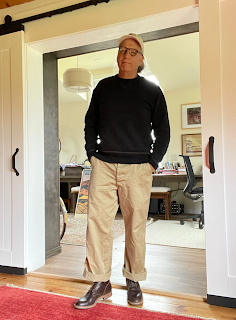The Top Button on the 25oz Denim And Other Matters of Connection
This piece is made of a series of paragraphs that once stood on their own, mostly in the form of diary entries. It's been cobbled into something because that's how we make connections of value. We have to learn how things come together when once they were just bits, pieces, some missing and broken and extra.
***
I had some errands to do in the world today, nothing particularly unpleasant but on the level of chores. I go to work more dressed for the part because I think that matters. I’ve plenty of latitude about how that might look. I make the flex and think it's important but that’s another story. Today was more casual.
I put on a pair 25oz heavy denim still relatively new. This means that it can take a moment or several moments to work your way into them, maybe a bit like body armor. That top button can also cause a thumb injury (not kidding) so you should be mindful. And the boots? There are YouTube videos about lacing fast all of those “speed hooks”---and some guys make it look like some kinda’ magic. But I like to do it all a bit more slowly. Good things often take time, excellent things are rare, and if there’s no cost, if it’s not just a wee bit hard to do, it’s just not for me.
***
Read on if you can stand more of this. I think this is about something that might connect for you even when you’re not sure what the hell I’m talking about. That may include the next few paragraphs.
There was a time when we built racing bicycles---sometimes to race, sometimes not, usually just to ride, sometimes just to put them together---with the best parts we could find, mixing and matching, experimenting and working with things that could be fixed (maybe) when they broke. Usually. Okay. Sometimes. Almost none of this is any longer true. Modern race bikes just work and other than the ride, they do the work for you.
Things were not better then though I would still argue that the Simplex 5500 is the finest shifting rear derailleur ever made and that if you know what a demultiplicator is then you’re hip to the right way, the wrong way, and the French way. Bicycles came from all over the world but you could work on them as if they were all, you know, bicycles. When things weren’t quite to our liking we drilled them out, shaved them down, and tried to make them better. We worked it out. That was where the fun was. Sometimes we failed. The imperfection was the perfection.
Remember those Campagnolo crankarms, the Super Record circa ’80-something, the ones that would form hairline cracks if you didn’t file the joint first? Of course you don’t. Most of them were replaced by mechanics who knew they were going to break before you broke them. Or they knew the solution. Anyone who didn’t file the crankarm joint first, before riding them, eventually broke them. That could end badly and I hope it didn’t for you. Life really was more dangerous when things weren’t guaranteed, warranted, or easy to send back.
We don’t see these sorts of bits on bikes much anymore but on, say, vintage bikes that don’t look like they were much used. That might be a shame but I don’t think it matters if we use things for their assumed purposes. We don’t have to ride bikes to love them or even to love what they are asking from us. I don’t fancy the new stuff because it really asks too little from me: it wants easy to use to be the reason to use it. I don’t think that’s what I want.
We can appreciate things for whatever reasons we like. But there was a time when you needed to figure things out. It’s not that stuff didn’t work. It’s that it didn’t do the work for you. Got film? Would you like to load a Leica Rangefinder?
Most of the old stuff in the rest of the modern world that’s like this has been replaced, forgotten, and passed by.
***
I’m sentimental about these matters because I feel deeply, because I was there for some of the really good stuff---and can we include The Beatles on Ed Sullivan in ’64 and that moment in ‘68 when suddenly there was Led Zeppelin and we lost our minds? I’m not being nostalgic. That’s an important difference. We’re not on some sentimental journey here. I’m trying to tell you about things that I can’t forget because something about them asks something from me and has delivered more that I could have imagined. Not everything gets better the more you use it but those that do are things to value.
Lot of things now are easier. Like taking a picture or calling someone. But we also want everything we want now, we expect them to be easy, and we don’t like it when things don’t work. Like the internet or the printer or when the mobile call drops. Things weren’t better when you couldn’t find a phone. Or had a dime. But they demanded a kind of effort and you had to decide to make that effort or do without. How much do you want the connection?
I’m not retro. I’m no Luddite. I don’t want to go back in time and, let me say it again: I don’t think things were “better back then.” Little was more infuriating than that lying political ad in 1979 declaring that “it’s morning in America” again. As if going back would make things better. Nonsense. And we’re not making things great again because we’ve actually got to commit to making things better now and for a better future. Besides where does any of that fantasy of the past get you? You’re left connecting to delusion, to conspiracies and inventions rather than memories, not to the honest past but to a present that refuses to connect to itself.
I’m also not the reenactor type. I don’t want to dress up in period costumes. I don’t dwell on how to make the perfect reproduction. Not that there’s anything wrong with any of that. Really. But many of the things I prefer, things I use daily are anachronisms. They will be no more obsolete tomorrow than they were twenty (or more) years ago. But when these things still work they are better than they were when new because they have been used regularly. When these things are new or new-ish---like these overbuilt jeans I’m wearing today---they just might get better when you decide to use them hard and commit to the work. Now that deserves our consideration. Maybe even italics.
Of course, we know that we’ve been treating the world as if it were disposable. There are a lot of folks working on recycling and renewables, trying to use less and fewer of those things that are ruining life on the planet. I wish I were more dedicated, maybe even fanatical about fixing this problem. I should be.
But there is another thing you can do. You can find things that will last, can be fixed or altered or repaired or rejuvenated, and most importantly make use of things that get better because you use them. They don’t have to come from a bygone age. They will naturally possess some durability but that isn’t the end game.
The point is that the connection gets deeper because you keep connecting and they move with you, they get better on you. Think of your favorite leather jacket if you have one. It doesn’t matter if you don’t. It’s like a baseball mitt. It’s yours when you use it and it's not right until you do the work to make it a part of you. An old bicycle or a new bicycle made of steel with “old” parts does it for me. You will have to learn in order to connect.
There’s a lot of romance and bullshit about old things. Much is made of the antiquated slow-working looms that make selvedge denim in Japan (and elsewhere) but the age of the loom doesn’t matter as much as the quality of the product. The harder I wear these jeans, the better they will get. And just to keep going---nothing is better than some well-worn boots because boots should only get better. If you’re working real hard to get them to “break in” it’s more likely they never fit in the first place. That said, there’s work involved and when well-used they are better than a second skin, more like Hobbit feet, it’s so right you may not notice. Now we’re getting closer to where the brass meets tacks.
Things can become a part of you. You can wear them and they will mold to you. They might mold to your body but more importantly they’ll work their way into your heart, into you.
You can handle them and shift them with friction in ways that requires finesse and care, and you put them on turntables carefully and listen to them. Yes, you will have to get up to deal with them once a full side is over but you will have half an album rather than another algorithm playlist. Some such things are regaining popularity---my reference to vinyl records is an obvious example. But unlike the audiophiles who insist the old ways are superior, I merely contend that they bring you closer to yourself, that what we really get from manual, analog, and harder to do things is a connection.
Aye, that’s it. You see: we long for connection. You might say that we can do that without things or even that things get in the way. You can make your case for whatever askesis you prefer but I will contend that your desire is the same: you want to feel a connection and tell a story that has meaning you haven’t fully fathomed. I’m saying this happens when you use things and buy things and keep things that insist an effort must be made, that it could take a moment, that it might be construed as inconvenient until you arrive at the connection that makes all the difference.
***
I’m going to start the process that will unbutton these jeans now and get ready for bed. The effort it took to get them on, like my slow lacing boots, may take almost as much time as it did this morning. If you can give yourself some time, the connection will make you feel a wee bit more human in this world. I’ll do something like this again tomorrow. Just to see if it works. The connection, I mean.


Comments
Post a Comment